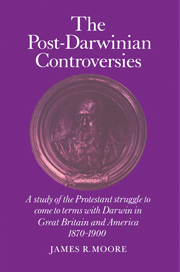 The Post-Darwinian Controversies
The Post-Darwinian Controversies Book contents
- Frontmatter
- Contents
- Dedication
- Preface
- PREFACE TO THE PAPERBACK IMPRESSION
- Introduction: the terrain of revision
- PART I HISTORIANS AND HISTORIOGRAPHY
- 1 Draper, White, and the military metaphor
- 2 Politics, polemics, and the military milieu
- 3 Warfare's toll in historical interpretation
- 4 Towards a non-violent history
- PART II DARWINISM AND EVOLUTIONARY THOUGHT
- PART III THEOLOGY AND EVOLUTION
- Conclusion: on coming to terms with Darwin
- Dedication
- Notes to the text
- Bibliography
- Index
4 - Towards a non-violent history
Published online by Cambridge University Press: 22 January 2010
- Frontmatter
- Contents
- Dedication
- Preface
- PREFACE TO THE PAPERBACK IMPRESSION
- Introduction: the terrain of revision
- PART I HISTORIANS AND HISTORIOGRAPHY
- 1 Draper, White, and the military metaphor
- 2 Politics, polemics, and the military milieu
- 3 Warfare's toll in historical interpretation
- 4 Towards a non-violent history
- PART II DARWINISM AND EVOLUTIONARY THOUGHT
- PART III THEOLOGY AND EVOLUTION
- Conclusion: on coming to terms with Darwin
- Dedication
- Notes to the text
- Bibliography
- Index
Summary
The many issues which Darwinism brought into focus…were the grounds of the spiritual struggle through which innumerable Victorians passed. … The popular name of the struggle was ‘science vs. religion’, but it was much more complicated than that crude simplification would suggest.
Richard D. AltickThe elaboration of metaphors is an important way in which human beings disclose their innermost feelings and beliefs. Metaphors, to use Max Black's terminology, present a ‘principal subject’ in terms of a ‘subsidiary’ one. A subsidiary subject consists of a ‘system of things’ which implies certain ‘commonplaces’ about itself. The system of things may therefore express some fundamental notions about the metaphor-maker and his world. The system is but a symbol and, as Paul Tillich, Colin Turbayne, and Mary Douglas have argued from their different points of view, the choice of symbols in religion reflects basic attitudes and assumptions about God and nature, society and mankind.
What then does the military metaphor reflect? What are the attitudes and assumptions which ‘conflict’ has expressed for historians of the post-Darwinian controversies? Most obviously, perhaps, it reveals the absence of any deep moral aversion from war. Historians would not have elected to portray the interaction of scientists and theologians in a figure which features violence and inhumanity had they been convinced that these things should be deplored. To ask why historians have not been so convinced, however, is to suggest a second level of analysis. The military metaphor has proved a congenial figure of speech because, as the foregoing chapters repeatedly illustrate, historians have been children of their times. They have employed the vocabulary of a milieu in which they themselves were partisans and participants.
- Type
- Chapter
- Information
- The Post-Darwinian ControversiesA Study of the Protestant Struggle to Come to Terms with Darwin in Great Britain and America, 1870-1900, pp. 101 - 122Publisher: Cambridge University PressPrint publication year: 1979


